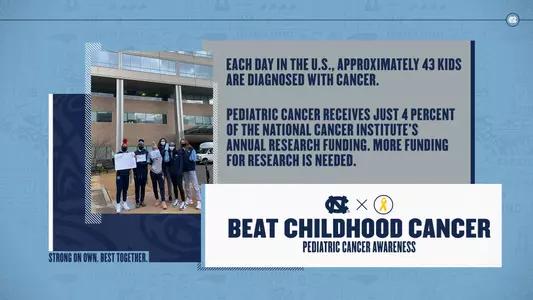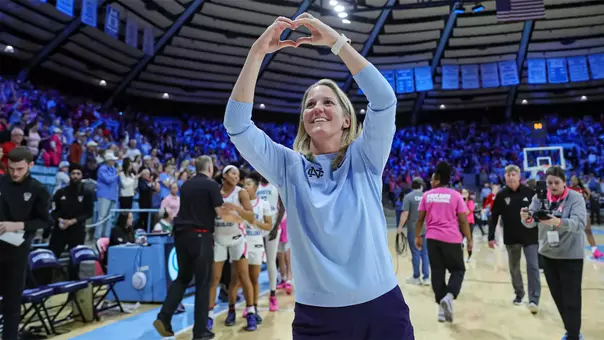University of North Carolina Athletics

Educate and Advocate: Pediatric Cancer
January 13, 2021 | Women's Basketball
CHAPEL HILL, N.C. – Throughout the 2020-21 campaign, the UNC women's basketball team will highlight various causes, dedicating the season to advocating for and bringing awareness to issues that are near and dear to the Tar Heel student-athletes and coaching staff.
UNC hosts Virginia Tech Thursday and the team has dedicated the game to raising awareness of pediatric cancer, which is the leading cause of death by disease in children in the U.S. and results in about 1,800 lives lost each year. Worldwide in 2017, cancer stole 11.5 million years of healthy life from children. This total could be lower if all children received adequate care and funding-dependent research continues to progress. (www.alexslemonade.org)
Some facts about pediatric cancer:
• In the U.S., cancer is the leading cause of death in children under the age of 19. Each day, approximately 43 kids are diagnosed with cancer, with lymphoma the most common type. (www.alexslemonade.org)
• The average age of children at the time of pediatric cancer diagnosis is 5. (morganadamsfoundation.org)
• In the U.S., 84 percent of children diagnosed with cancer live at least five years after diagnosis, but this does not mean they are cured or free from long-term side effects. Childhood cancer survivors are twice as likely as other kids to suffer chronic health conditions. (www.alexslemonade.org)
• UNC's pediatric oncology program is part of the UNC Lineberger Comprehensive Care Center, one of 41 National Cancer Institute-designated comprehensive cancer centers. It's recognized as one of the top hospitals for pediatric cancer care. (uncchildrens.org).
This week our team spent time with pediatric oncology patients at UNC, doing so in a way that was safe and socially-distant but still fun. The Tar Heel players gathered on the sidewalk beside the building, while kids looked down from the pediatric area two floors up. The players held up signs of encouragement and talked with the kids using walkie-talkies.
You can help by donating your time and money to organizations that provide funding for research and support services for families of patients. Additionally, you can donate items (especially around the holidays) and participate in events that provide entertainment for young patients.
The following organizations offer opportunities to learn more and make an impact.
• UNC Children's Hospital (www.uncchildrens.org)
• Alex's Lemonade Stand (www.alexslemonade.org)
• National Cancer Institute (www.cancer.gov)
• St. Jude Children's Research Hospital (www.stjude.org)
Together we can raise awareness of pediatric cancer and work toward a cure.
UNC hosts Virginia Tech Thursday and the team has dedicated the game to raising awareness of pediatric cancer, which is the leading cause of death by disease in children in the U.S. and results in about 1,800 lives lost each year. Worldwide in 2017, cancer stole 11.5 million years of healthy life from children. This total could be lower if all children received adequate care and funding-dependent research continues to progress. (www.alexslemonade.org)
Together we can raise awareness of pediatric cancer 💛
This is #BiggerThanBasketball
More info here ➡️ https://t.co/hPJbSCcMIq
#EducateAndActivate | #TogetherWeWin pic.twitter.com/o6YC9pFELs— Carolina Women's Basketball (@uncwbb) January 14, 2021
Some facts about pediatric cancer:
• In the U.S., cancer is the leading cause of death in children under the age of 19. Each day, approximately 43 kids are diagnosed with cancer, with lymphoma the most common type. (www.alexslemonade.org)
• The average age of children at the time of pediatric cancer diagnosis is 5. (morganadamsfoundation.org)
• In the U.S., 84 percent of children diagnosed with cancer live at least five years after diagnosis, but this does not mean they are cured or free from long-term side effects. Childhood cancer survivors are twice as likely as other kids to suffer chronic health conditions. (www.alexslemonade.org)
• UNC's pediatric oncology program is part of the UNC Lineberger Comprehensive Care Center, one of 41 National Cancer Institute-designated comprehensive cancer centers. It's recognized as one of the top hospitals for pediatric cancer care. (uncchildrens.org).
This week our team spent time with pediatric oncology patients at UNC, doing so in a way that was safe and socially-distant but still fun. The Tar Heel players gathered on the sidewalk beside the building, while kids looked down from the pediatric area two floors up. The players held up signs of encouragement and talked with the kids using walkie-talkies.
Visiting with young patients at @uncchildrens this week looked a little different due to Covid, but it was still lots of fun! 💙💛
Learn more about the fight against pediatric cancer and ways you can help ➡️ https://t.co/hPJbSCuo70#EducateAndActivate | #TogetherWeWin pic.twitter.com/0cMr3tI1nx
— Carolina Women's Basketball (@uncwbb) January 16, 2021
You can help by donating your time and money to organizations that provide funding for research and support services for families of patients. Additionally, you can donate items (especially around the holidays) and participate in events that provide entertainment for young patients.
The following organizations offer opportunities to learn more and make an impact.
• UNC Children's Hospital (www.uncchildrens.org)
• Alex's Lemonade Stand (www.alexslemonade.org)
• National Cancer Institute (www.cancer.gov)
• St. Jude Children's Research Hospital (www.stjude.org)
Together we can raise awareness of pediatric cancer and work toward a cure.
UNC Men's Basketball: Tar Heels Roll Past Yellow Jackets, 91-75
Saturday, January 31
Carolina Women's Basketball 2025-26 | In Pursuit: Episode 4 - "It's Us"
Saturday, January 31
MBB: Hubert Davis Pre-Georgia Tech Press Conference
Friday, January 30
Carolina Insider - Interview with Megan Streicher (Full Segment) - January 30, 2026
Friday, January 30














